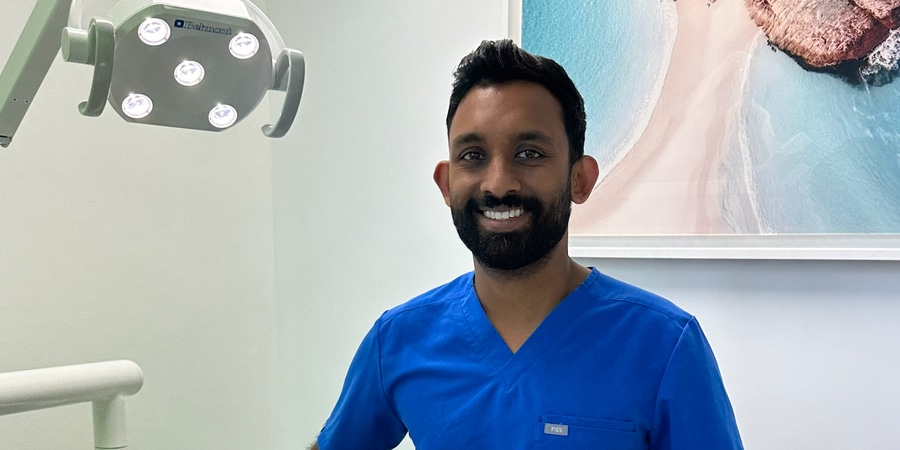
“I feel really fortunate to be involved with CPA. What I love is we’re providing solutions and tailored care for a section of society who are at a disadvantage – people with disability have statistically worse dental problems than the majority of the population.”
Our modern dental clinic, located in Allambie Heights on Sydney’s northern beaches, offers complimentary specialist services, for people with cerebral palsy. The clinic is made possible by dedicated volunteers – 28 dentists, 2 dental assistants and 2 hygienists.
We spoke to one of the dental volunteers, Dr Rohan Krishnan, who has been volunteering for the past two years. Rohan is also the President of the Australian Dental Association.
“Volunteering is such a big part of our community, it thrives on volunteers. It’s only possible because of the benevolence and vision of volunteers. It’s been an eye opening, huge learning experience and a wonderful way to give back.”
For Rohan, volunteering hits to the core of humanity, raising up and helping others who need dental care more regularly than the general public.
There is often a deterioration of preventable disease in the mouth for people with cerebral palsy, due to reasons like lack of dexterity, or ability to self-care. People with CP have a range of physical, mental and cognitive differences which require a different level of care to the general population. Physical differences include involuntary spasms, seizures, chronic muscle movements, inability to swallow, risk of inhaling or ingesting particles through the wrong pipe into the lungs. Cognitive impairment may perceive a dental environment to be too challenging for them to go through.
Rohan commented that the training which dental volunteers receive to help them understand CP patients better is vital in enabling them to provide bespoke and tailored care to patients. The clinic facility itself is set up to treat CP patients who don’t have the physical mobility to be treated in a conventional dentist. It’s a large room, with chairs that are adaptable for wheelchairs, and for different seating and support needs.
Rohan commented on the importance of having a support team, like the one at CPA, that understands the needs of patients with cerebral palsy is vital for our dental clinic and all our services.
“What makes the CPA dental clinic so special and effective is we have the time, space and support staff to be able to deal with the patients’ diverse and specific needs, and the systems to be able to fast track care where it’s required. From the time they walk through the door at CPA Allambie to the time they leave, every single person understands their diverse needs and the family have the best experience possible.”
One thing that concerns Rohan is that many patients with CP aren’t able to communicate the pain they’re experiencing. Rohan sees pain relief as a basic human right, and as traditional communication methods may not be as effective, dentists pick up on other visual cues and make assumptions because of the kind of infections they have. For example, one patient comes in and she only says one sentence “I’m so happy”. It’s the tone she communicates with that allows Rohan insights into what she needs. Sometimes General Anaesthetic is a viable option. The connection to General Anaesthetic (GA) clinics in the hospital system means these patients can get fast tracked care if they can’t undergo treatment in the chair while they’re awake.
The idea of helping another human being is the main reason Rohan wanted to be a dentist. Even though you can do this in many different professions, in dentistry it’s unique in that someone presents with a problem and it can be completely fixed in the same appointment.
“It’s such a fulfilling career being embedded in the community, helping others, having that continuity with a person, and most of the time being able to fix the problem.”
At 35, Rohan is a young leader in dentistry with a future focus whose vision is to be as free of preventable disease as we can be. His role as President of the Australian Dental Association involves understanding the risks to the organisation and profession, and coming up with a strategy to deal with that. Plus, managing a CEO and Executive team, board meetings, a public facing media role, dealing with health ministers and regulators, dental publications, speaking to Uni students and graduates, and regional NSW groups.
Rohan believes all Australians should have access to pain relief and a multidisciplinary healthcare system with person centred, rather than disease centred care. For example, in cancer therapy there might be psychological and mental aspects, impacts to the person’s ability to do every day task and impacts on other body systems, not just the system that has the cancer.
“Person-centred care brings home the humanity of what we’re doing in health. In the last 20-30 years we’ve progressed a lot but if we could have greater person centred and an interconnected healthcare that’s free from preventative disease, we’re going in the right direction.”
Rohan hopes the work at the CPA dental clinic can show other communities with unmet needs that there can be a solution – communities in regional and rural Australia dealing with access issues to dental care, linguistically diverse areas, who don’t know what’s available in publicly funded healthcare, and people unable to afford dental care who are on long waitlists in the public sector.
“In a society where we’re becoming more selfish, CPA’s purpose is the opposite; it’s community centric and for others.”

